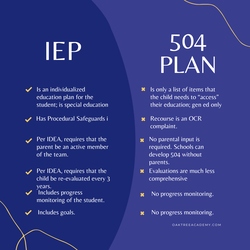 Photo by CDC on Unsplash Photo by CDC on Unsplash Don't wait until it's too late to find out if your child is eligible for summer services! Spring is the time when school administrators plan for Extended School Year (ESY) services, designed to prevent regression and ensure a Free and Appropriate Public Education for students with disabilities. In this blog post, we'll guide you through the process of determining your child's eligibility for ESY and provide strategies for advocating and securing these vital services. Get ready to make the most of the summer and set your child up for success!
0 Comments
 Photo by Guille Álvarez on Unsplash Photo by Guille Álvarez on Unsplash Welcome to our blog post dedicated to strategies for promoting independence in special education students! In this guide, we'll delve into practical techniques and approaches that can help students with disabilities gain confidence, develop essential life skills, and become more self-reliant. By fostering independence, we empower these students to navigate the world with greater autonomy and thrive in their academic and personal lives.  Photo by Wesley Tingey on Unsplash Photo by Wesley Tingey on Unsplash There seems to be a lot of confusion and misguided advice floating around when it comes to IEP violations being labeled as "illegal." Let's set the record straight and understand the nature of IDEA (Individuals with Disabilities Education Act) and its role in the realm of special education. #IEPLegalMatters #MisconceptionClarified IDEA is an administrative statute, which means that it is not a criminal law. Violating an IEP does not lead to criminal charges. Instead, IDEA operates within the framework of administrative law, where compliance and enforcement take a different course. Administrative statutes, such as IDEA, are created by administrative agencies or government departments with delegated authority from the legislative branch. These agencies are responsible for enforcing and interpreting laws and regulations specific to their expertise. They play a vital role in shaping and regulating various aspects of our society. #AdministrativeStatutesUnveiled Unlike criminal laws that can result in legal charges, violating an administrative statute like IDEA can lead to consequences such as penalties, fines, or other remedies through the administrative process. However, it's important to note that criminal charges are generally not applicable in the context of IEP violations. Examples of other administrative statutes include
While IDEA violations may not lead to criminal charges, it doesn't diminish their significance. Violating an IEP can have serious consequences for the education and well-being of students with disabilities. It's crucial for parents, educators, and advocates to be aware of their rights, seek remedies through the administrative process, and work towards ensuring the proper implementation of IEPs. So, remember that IDEA is not a criminal law, but it still holds immense importance in safeguarding the rights of students with disabilities. Let's focus on understanding the administrative framework and advocating for the proper implementation of IEPs to ensure every child receives the support they need to thrive in their educational journey. 📚💪 #IDEAInsights #IEPAdvocacyJoin the Advocacy Movement! 🤝✊ Now that you have a clearer understanding of IDEA, administrative statutes, and the significance of IEP violations, it's time to take action. Here's how you can make a difference: 1️⃣ Educate yourself: Continue learning about special education laws, rights, and processes. Stay informed and empower yourself with knowledge. 2️⃣ Advocate for change: Be a voice for students with disabilities and their families. Raise awareness about the importance of proper IEP implementation and the need for meaningful support and accommodations. 3️⃣ Collaborate with others: Join parent support groups, connect with advocacy organizations, and engage with educators and policymakers. Together, we can amplify our voices and drive positive change. 4️⃣ Share your experiences: Share your stories and experiences with IEPs to raise awareness and inspire others. Your journey can offer guidance and support to those navigating the special education system. 5️⃣ Be proactive: If you encounter IEP violations or feel that your child's needs are not being met, take appropriate steps to address the situation. Reach out to school administrators, seek guidance from advocacy groups, and explore available remedies. Let's work together to ensure that every child with a disability receives the quality education they deserve. By advocating for the proper implementation of IEPs and supporting families in their journey, we can create a more inclusive and empowering educational system. 💙🌟 #IEPAdvocacy #EveryChildMatters  Welcome to our blog post where we tackle the intriguing question: Is an Individualized Education Program (IEP) a legal document? 🤔✍️ As parents, educators, and advocates in the world of special education, it's essential to understand the legal aspects surrounding IEPs and the implications they have for students with disabilities. In this informal guide, we'll delve into the depths of IEPs and their legal foundation, shedding light on their binding nature, rights and protections, and the role they play in ensuring equal access to education. So, grab a cup of coffee ☕, get comfortable, and let's embark on this journey to unravel the legalities of IEPs. #IEPLegalities #DisabilityRights part 5Navigating the world of special education can be complex, especially when it comes to understanding the differences between an Individualized Education Program (IEP) and a 504 plan. These two educational frameworks play vital roles in supporting students with disabilities, but their purposes, eligibility criteria, and services provided are distinct. In this article, we will delve into the key differences between IEPs and 504 plans to shed light on their unique features. By gaining a deeper understanding of these educational tools, parents, educators, and advocates can effectively advocate for students and help them thrive in their educational journey. So let's dive in and explore the contrasting characteristics of IEPs and 504 plans.  Here are some additional difference between an IEP and a 504 plan:
Are you navigating the world of special education for your child? Take charge of their educational journey by understanding the differences between IEPs and 504 plans. Empower yourself with knowledge, advocate for your child's needs, and ensure they receive the support they deserve. Remember, you are their strongest advocate. Together, let's create a supportive and inclusive learning environment. Part four Enhancing Support: A Comprehensive Approach: Comprehensive Support: Empowering Every Aspect of a Child's Education 🤝📚 Let's explore how the coexistence of an IEP and a 504 plan can offer a comprehensive support system for students with disabilities. By combining the individualized goals and specialized instruction of an IEP with the accommodations and equal access provisions of a 504 plan, students can receive a holistic approach to their education. This powerful combination allows for a tailored support system that addresses diverse needs and promotes inclusive learning environments. Discover the benefits of this comprehensive approach and how it can positively impact a child's educational journey. When these two plans join forces, they create a comprehensive support system that leaves no stone unturned in meeting the unique needs of students with disabilities. With an IEP, students receive individualized goals and specialized instruction that cater to their specific learning requirements, nurturing their strengths and helping them overcome challenges. 🎯📚 Meanwhile, the accommodations and equal access provisions offered by a 504 plan ensure that students can fully participate in the educational experience, regardless of their disabilities. By combining these elements, a holistic approach to education emerges, fostering inclusive learning environments where every child can thrive. 💼 Discover the multitude of benefits that this comprehensive approach brings, empowering students and setting them on a path to success in their educational journey. #ComprehensiveSupport #HolisticApproach #InclusiveEducation Part 3 Photo by Firmbee.com on Unsplash Photo by Firmbee.com on Unsplash Overlapping Eligibility: Can a Child Qualify for Both? Dual Eligibility: Unlocking the Potential 🤝✅ Introduction: In this section, we'll explore the intriguing question of whether a child can qualify for both an Individualized Education Program (IEP) and a 504 plan. While these educational frameworks have distinct purposes, there are instances where a student may be eligible for both, leading to overlapping support. Let's delve into the complexities of dual eligibility, understanding how it can benefit students and empower them to reach their full potential. part twoUnveiling the Contrasts: IEPs vs. 504 Plans 📊🚦  In this section, we'll delve deeper into the key differences between Individualized Education Programs (IEPs) and 504 plans. While both serve to support students with disabilities, they have distinct features that cater to different needs. By understanding these differences, parents and educators can make informed decisions about the most appropriate plan for their child's unique requirements. Let's explore the contrasting aspects of IEPs and 504 plans and their significance in special education. Part 1: demystifying iep's and 504 plans Welcome to our insightful blog post, where we unravel the intriguing question of whether a child can have both an Individualized Education Program (IEP) and a 504 plan. 🧩 In this informal and informative guide, we'll explore the key aspects of IEPs, 504 plans, and the potential coexistence of these support systems. Let's embark on this journey together to understand the possibilities and empower our children. 🌟💪 Decoding the IEP Evaluation Results: Your Guide to Sailing Through the IEP Eligibility Meeting5/27/2023  Photo by Brett Jordan on Unsplash Photo by Brett Jordan on Unsplash Welcome, parents and advocates, to our informative blog post on proving IEP goals were not developed or met with fidelity. As parents of exceptional learners, it is crucial to be well-informed and empowered to ensure our children receive the educational support they deserve. In this post, we will delve into the essential steps to evaluate and challenge IEP goals that may not have been appropriately developed or implemented. By understanding the process and advocating effectively, we can help our children reach their full potential. Let's dive in! 💪📚 |
OTA AuthorThe Oak Tree Academy mission is to improve the quality of life of people with language-based learning disabilities and their families by developing programs and disseminating knowledge based on current research. Archives
April 2024
Categories
All
|
 RSS Feed
RSS Feed